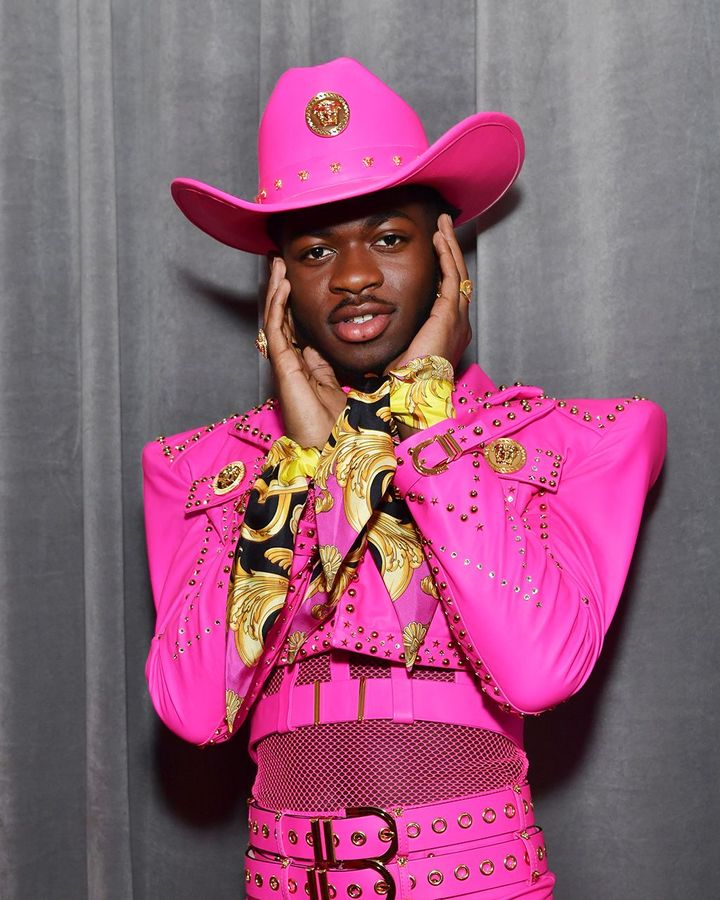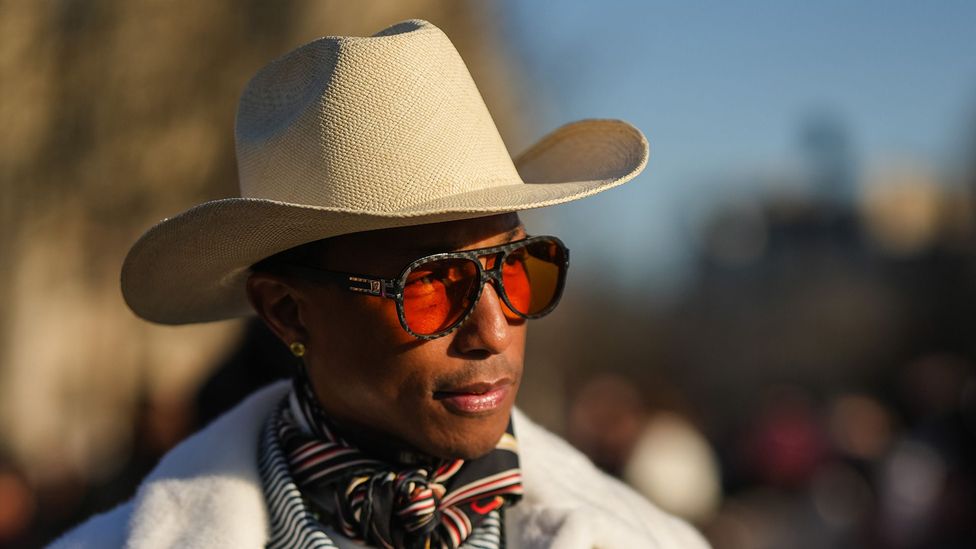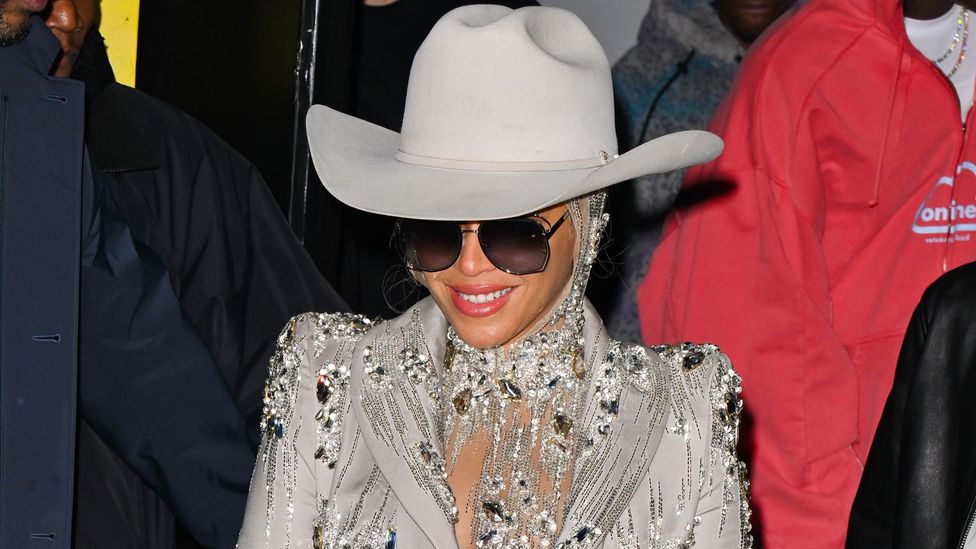For Beyoncé fans, Sunday's Super Bowl was a joyous affair. Appearing in an advert for a mobile phone company, the singer teased new music, before dropping two new singles – Texas Hold 'Em and 16 Carriages – and the release date for her second album in the Renaissance trilogy later that night. Both the singles and their cover art – which show the star decked in two different black cowboy hats – confirmed suspicions that the Houston-born artist would adopt a country theme for her newest release, due on 29 March. Then at New York Fashion Week, there she was again. In the front row, resplendent in a silver-grey ensemble, topped with the now signature cowboy hat.
More like this:
- Why Beyoncé is reclaiming country music
- How hip hop rose to the tops of fashion
- How one great sweater can last a lifetime
Of course, the cowboy hat is not a new accessory for Beyoncé: the Renaissance tour has become synonymous with the mirror-ball iteration she sported both for the live show and its promotional shots, while archive photos of Destiny's Child show her taste for the ten-gallon hat dates back to the start of her career.

Musician Lil Nas X sported a bright pink cowboy hat at the 2020 Grammy Awards (Credit: Getty Images)
Yet Beyoncé's current embrace of the Western aesthetic both galvanises and plays into a wider trend, one that journalist and cultural critic Brittany Luse described last year as "a collective and proud reclamation of the cowboy for those who have traditionally felt threatened or excluded by the archetype of the white, patriarchal, ruggedly individualistic gunslinger".
The Marlboro Man was defined by his cool yet commanding attitude – and his wide-brimmed hat
Because the truth is that the cowboy archetype – as embodied by John Wayne and Buffalo Bill – is little more than a myth, perpetuated by mid-20th-Century Hollywood Westerns. In these films, the "goodies" are almost exclusively white Stetson-sporting "cowboys", while the "baddies" are most commonly Native Americans whom the cowboys wish to conquer. The macho cowboy paradigm was further galvanised by the arrival of the "Marlboro Man" in 1954: that emblem of rugged masculinity dreamed up by the US cigarette company. Of the various Marlboro Men, the almost-always white cowboy was the most recurrent and renowned, defined by his cool yet commanding attitude – and his wide-brimmed hat.
Historically, however, one in four cowboys was black, while many others were of Mexican origin, and their stories were largely written out of US history and imagery. And it is this fact, paired with the iconic nature of the Western aesthetic and the undeniably romantic notion of the cowboy as a self-determined lone ranger, that has rendered the cowboy so ripe for reclamation and reinterpretation across popular culture.
"Yeehaw agenda"
This isn’t exclusive to today, of course. In the 1940s and 50s, actress Dale Evans showed that women could be cowboys too, donning her hat on the back of her head so that it framed her curls like a halo and taking the male-dominated Western genre by storm. Dolly Parton later claimed the mantle, giving the cowboy hat a rhinestone-embellished spin, while high fashion has long referenced and subverted the cowboy trend, from Ralph Lauren and Calvin Klein through to Moschino and Chanel.
I feel like when you see cowboys portrayed, you see only a few versions – Pharrell Williams
But it wasn't until 2019 that we officially entered the new age of the cowboy. This was the year that Telfar launched its autumn/winter 2019 collection championing the black cowboy, and that black queer artist Lil Nas X released his chart-topping single Old Town Road, and wore a neon pink Western ensemble, replete with a matching cowboy hat, to the Grammys. Soon, other black artists from Solange and Lizzo to Cardi B and Kelela were reclaiming and reframing the look in cowboy hats, boots, chaps and fringing, giving rise to the trend dubbed the "Yeehaw Agenda" on social media.

Pharrell Williams embraced the cowboy hat in his recent collection for Louis Vuitton (Credit: Getty Images)
And it's still going strong: earlier this year, Pharrell Williams threw his Stetson in the ring, offering up his take on the movement at the presentation of his sophomore collection for Louis Vuitton in Paris. There, models stomped the runway in looks that gave an urban twist to ranch style, almost every one wearing a version of the cowboy hat, be it in soft suede, traditional felt or slick leather. "I feel like when you see cowboys portrayed, you see only a few versions," the designer said backstage. "You never really get to see what some of the original cowboys really look like. They look like us, they look like me, they look black, they look Native American."
Beyoncé, meanwhile, has taken the trend – and its important implications – to even bigger heights. In 2021, she launched a black rodeo-inspired Adidas x Ivy Park collection, explaining to the Houston Chronicle that it was inspired by "how much of the black, brown and Native cowboy stories are missing in American history".
Moreover, Luse argues in her essay, in adopting the guise of "an intergalactic disco cowboy" for the tour – an image reinforced by the Texas Hold' Em song artwork – "Beyoncé, a black Texan woman, is both imagining a radical black future and recalling the truth of the past". And she's doing so cowboy hat in hand – turning all its associations with white patriarchal colonisers upside down, with no signs of slowing down.
If you liked this story, sign up for The Essential List newsletter – a handpicked selection of features, videos and can't-miss news delivered to your inbox every Friday.
